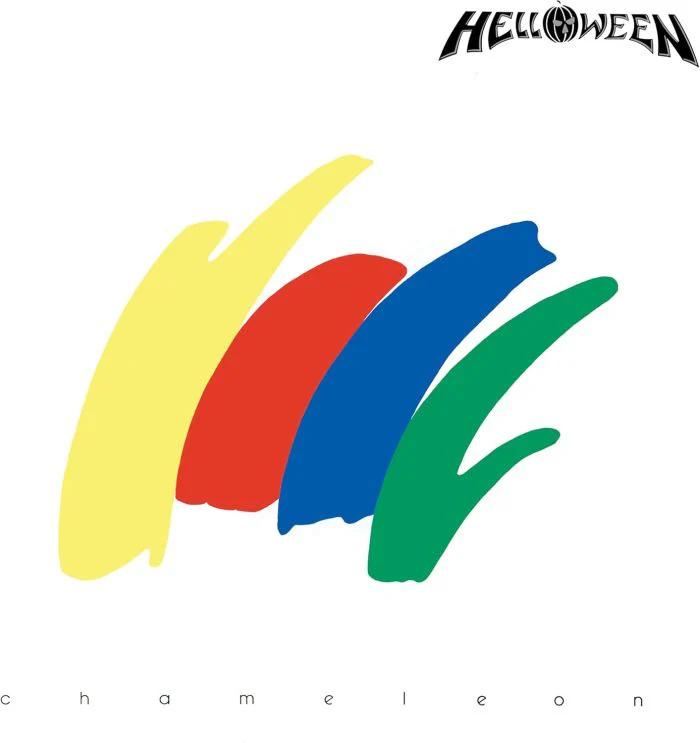A miserable listen. One of the most violently wrong-sounding albums I own. It captures a band ready to break up, and its silly melodies and forced-happy tone gives it a tragicomic “fiddling on the Titanic” tone. The singer was fired three months after its release, and a year after that the drummer jumped in front of a train.
It’s the only Helloween album that gives me no way in, the only one where the question “what were they trying for here?” has no clear answer. The title and cover suggests a band making a statement for artistic diversity: for breaking out of the power metal ghetto, for doing the unexpected. But “weird” is an adjective, not a noun. An approach, not an identity. You can’t have a band founded on sonic diversity and nothing else: that simply means you don’t have a sound. The cover sums things up—it’s colors for the sake of colors, not actually a painting of anything.
In practice, Chameleon is a three-way solo album between singer Michael Kiske and guitarists Michael Weikath and Roland Grapow, who are now apparently communicating through lawyers who end every correspondence with “conduct yourself accordingly”. The hostility in this hate triangle is palpable, and bleeds through on the record. None of them like or respect what the other two are doing, and at times they almost seem to be sabotaging each other. Also present are the ever-reliable bassist Markus Grosskopf, who does what he can, and drummer Ingo Swichtenberg, whose paranoid schizophrenia was sadly worsening, and who clearly hates the Beatles- and Queen-influenced songs more than anyone.
It’s horribly overproduced, and an example of how money can’t make bad music good. Songs like “In the Night” are overwrought and overthought, packed with vocal and guitar and saxophone (?) overdubs to disguise how weak they are. Synthesizers prove a particularly hateful presence: even good songs like “Giants” and “I Believe” have cheesy bleep-bloopy one-finger Fairlight arpeggios on them, of the sort you normally hear on Huey Lewis songs. Abominable. If you’re ripping off Queen, couldn’t you also rip off the “No Synthesizers” sleeve notes?
Michael Weikath’s songs have the largest quality delta. “First Time” is an okay hair metal song that passes without much pain. “Giants” is actually a minor classic, and would have fit well on either Keeper album. It has a heavy as hell NWOBHM-influenced main riff, and the chorus is sublime. “Don’t you, won’t you, say that we’ll be free again!” On the other hand, “Revolution Now” is a droning 70s Jimi Hendrix knockoff that’s eight minutes long. It sounds like Oasis’s Be Here Now, and is equally boring. “Windmill” (or “Shitmill”, in Ingo’s memorable term) is the worst ballad ever written by the band: rank, rancid, and insipid.
Roland Grapow’s songs are largely dull. “Crazy Cat” has some big band flash but no good hooks. You’d have to pay me to listen to “I Don’t Wanna Cry No More” again. “Music” has a Pink Floyd-inspired bridge with some fine single-coil Strat guitar soloing, but otherwise is as unmemorable as its title implies. “Step Out of Hell” is filler burdened with yet more synth cheese.
Michael Kiske was never the band’s greatest songwriter. Here, he offers a surprise in “I Believe”, an emotionally bludgeoning but effective ode to faith that’s nearly a masterpiece. It has some wonderful ideas in the Iron Maiden/Manilla Road vein (ironically, he’d soon swear off heavy metal entirely), but it’s just too long and draggy. It needed some tempo changes in the middle. Still, I think this might be the album’s finest track. “When the Sinner” is overlong and mediocre at best, and is overloaded with questionable ideas (if you’re one of the millions of fans who thought “Helloween would sound much better with alto sax solos”, then I’ve got the album for you.) The Paul McCartney-esque “In the Night” is just too sonically confused to stay in the memory.
Not only did Helloween tear to shreds what made them successful, they replaced it with…nothing. Just shallow, derivative imitations of other bands and styles. Chameleon has two good songs and ten bad ones, with saxophones and synthesizers. At times it seems like a practical joke. At least they released it in 1993, when the world’s appetite for retro-progressive dad rock was at an all time low. The album’s title feels appropriate: it was literally invisible.
No Comments »
Comments are moderated and may take up to 24 hours to appear.
No comments yet.

